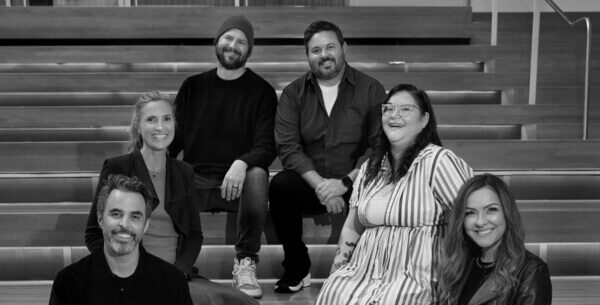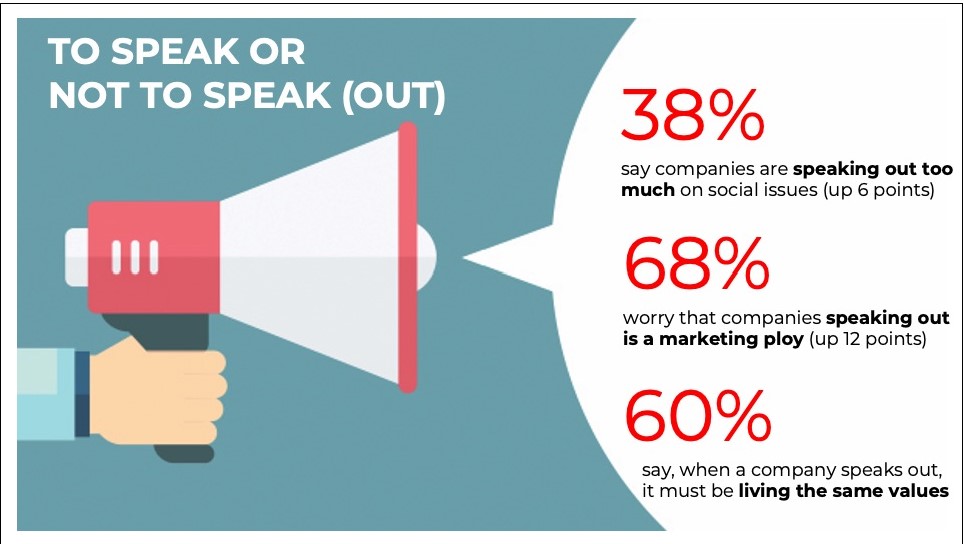Data
WHAT THE DATA SAY: 38% say companies are speaking out too much on social issues
By: Ray Day
CONTACT:
We wanted to share our latest consumer and business insights, based on research from Stagwell. Among the highlights of our weekly consumer sentiment tracking (fielded Feb. 10-12):
WORRIES ABOUT ECONOMY JUMP:
Today, 90% of Americans are concerned about the economy and inflation – up 5 points from last week and up sharply from 82% in December.
- 84% worry about U.S. crime rates (up 6 points)
- 82% about a potential U.S. recession (up 2 points)
- 75% about affording their living expenses (up 5 points)
- 75% about political divisiveness (up 3 points)
- 72% about the War on Ukraine (up 2 points)
- 55% about a new COVID-19 variant (down 2 points)
- 47% about losing their jobs (up 2 points)
WHEN SHOULD COMPANIES SPEAK OUT?:
Following the State of the Union (SOTU) address, we surveyed Americans to pinpoint their views on the buy-American theme as well as to update our past research on companies “speaking out” on social issues. We found strong views on both.
“Made in America”
- Nearly three-quarters (73%) of Americans say they often seek American-made products and brands when shopping (up 1 point from July 2022), especially true among those who watched some or all of the SOTU.
- Regarding intentionally purchasing American-made products and brands, 71% report doing so a little bit or a lot.
- 53% have shopped for an American-made product in the last month.
- 76% of Americans agree that there should be more American-made products and brands available in the U.S.
- 76% agree that brands need to make more products in the U.S. (up 1 point from July 2022).
- 56% would be willing to pay more for a product if they knew it was American made.
- However, 45% believe that American-made products already are too expensive.
“Speaking Out in America”
- A third of Americans (38%) think that American companies are speaking out too much on social issues (up 6 points from July 2022).
- 37% believe companies are speaking out the right amount (down 3 points from July 2022), while 25% believe they aren’t speaking out enough (down 3 points).
- 68% of Americans think that, when companies voice their opinion on a social issue, it’s a marketing ploy (up 12 points from July 2022).
- When companies are speaking out on social issues, 71% of Americans agree that a company’s history on social issues is important.
- 60% agree that when a company speaks out on social issues, it must be supported by living their internal company values.
- More Americans believe that there is generally more risk (59%) to a CEO speaking out on social issues (up 5 points from April 2022) than reward (41%).
- Democrats (55%) are more likely to believe there is more reward in a CEO speaking out than Republicans (33%).
- Americans also believe that CEOs expressing their own political views is bad for the company (47%, up 5 points from April 2022), more so than good.
TRAVEL TRENDS FOR THE NEXT DECADE:
During the next three years, nearly 2 billion people will travel at least once a year – making the travel and hospitality industry continually attractive. Yet what does the future hold? Stagwell’s Northstar partnered with travel technology company Amadeus on new research defining four new types of travelers – in a report titled Traveler Tribes 2033 – who will emerge in the next decade along with suggestions on what brands need to do to create relevant travel experiences for them.
- Excited Experientialists:
- 44% are without children and have a mid- to high-income job with flexible working options, which enables them to readily explore the world. They are more likely than other travelers to act on instinct, making them “anti-planners” and favoring less predictable and more exciting accommodation experiences. They also are open to technology like the use of artificial intelligence in the airport environment.
- Memory Makers:
- 44% are ages 42 and older and are habitual in their travel behaviors. They put people first and place less value on technology and sustainability, reassured by existing methods. Despite their skepticism about technology, they are excited about virtual reality and augmented reality preview tours before purchasing a trip.
- Travel Tech-fluencers:
- 48% of the group are under the age of 32, and their perspective is symbolized by how much technology they own. While many want to travel sustainably, they are more conscious about sustainability options around their method of travel, rather than where they’ll be staying.
- Pioneering Pathfinders:
- 82% are between the ages of 23 and 41. They like to plan but are not afraid of risk and are open to new experiences. This group is more willing than others to let sustainability influence their decisions. They will be very comfortable using all forms of alternative payment methods – whether cryptocurrency or within a virtual reality environment.
EMPLOYEES AND HR DISAGREE ON RACIAL EQUITY PROGRESS:
Our new State of Inequity report with Hue illuminates wide disparities along racial lines in workplace opportunity, compensation and experience in a post-pandemic labor market.
- More than 200,000 Black and Latina women have disappeared from the workforce since the pandemic’s beginning. Many have stopped looking for new jobs, making them invisible to unemployment statistics and ineligible for federal benefits.
- Most BIPOC employees report their employer has not instituted racial awareness training (82%) nor have they increased recruiting efforts toward racially diverse hiring (81%).
- A gap exists between HR and employees: 84% of BIPOC employees report their company has not addressed the mental/emotional impact of discrimination on its employees of color since June 2020. At the same time, 91% of HR professionals surveyed say the various diversity-related initiatives their companies have implemented are effective.
- One in four BIPOC women report not being paid fairly and in a comparable way to other colleagues at their level across their company.
- BIPOC women are twice as likely not to be paid fairly and in a comparable way to other colleagues across their company compared to white men.
- Two in Five BIPOC women reported feeling exhausted or burned out last year because of their workplace.
- BIPOC women are twice more likely to report they have felt fatigued related to racial tension or issues at work in the last six months compared to white men.
- More BIPOC women are not comfortable being fully themselves at work, twice as likely compared to white men.
- Even in the face of workplace hardships, BIPOC women are investing in themselves. Nearly twice as many BIPOC women (45%) report gaining new skills or education to become a more competitive job candidate compared to white Americans (27%).
ICYMI:
In case you missed it, check out some of the thought-leadership and happenings around Stagwell making news:
- Vast Majority of Americans Prefer In-Person Job Interviews vs. Virtual
- Exploring the future of money
- The high price of being single: ‘It’s all on one person’
- Americans With Trouble Sleeping Report Their Sleep Affects Their Relationships
As always, if helpful, we would be happy to provide more info on any of these data or insights. Please do not hesitate to reach out.
Thank you.
Related
Articles
In the News, Press Releases, Talent & Awards
Mar 12, 2025
GALE Wins Ad Age Business Transformation Agency of the Year and Adweek U.S. Media Agency of the Year

In the News, Press Releases, Talent & Awards
Mar 10, 2025
Four Stagwell (STGW) Agencies – 72andSunny, Anomaly, Code and Theory and GALE – Awarded 2025 Ad Age Agency A-List Recognition for Business and Creative Transformation

In the News, Press Releases
Mar 07, 2025
Left Field Labs Celebrates 17 Years of Building What’s Next Amid Expanding Global Client Roster






